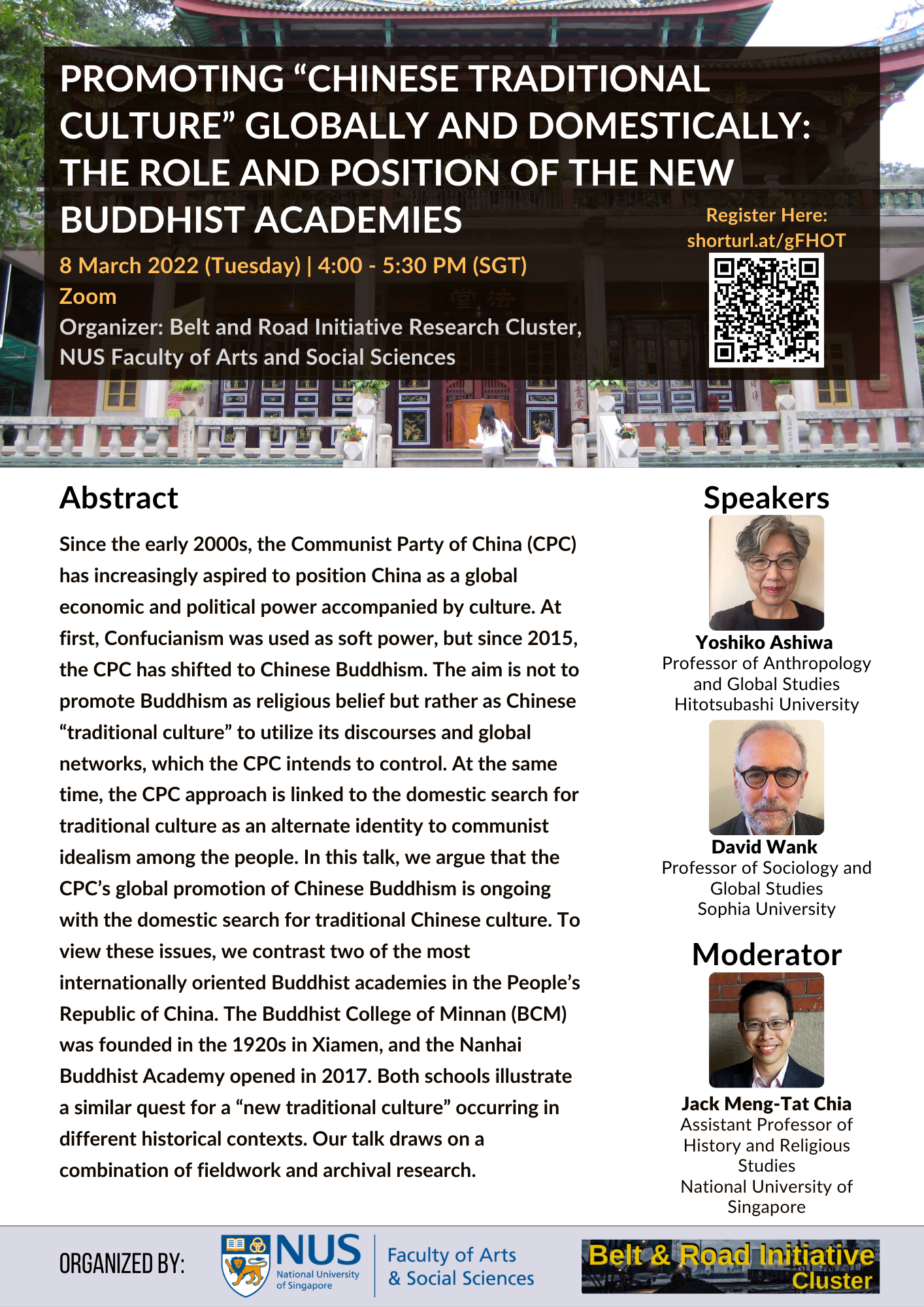Promoting “Chinese Traditional Culture” Globally and Domestically: The Role and Position of the New Buddhist Academies

You are invited to an online seminar titled Promoting “Chinese Traditional Culture” Globally and Domestically: The Role and Position of the New Buddhist Academies, hosted by the Belt and Road Initiative Research Cluster at the NUS Faculty of Arts and Social Sciences.
Please register through the link below.
Date: Tuesday, 8 March 2022
Time: 4 PM to 5:30 PM (Singapore Standard Time)
Registration via Zoom: https://shorturl.at/gFHOT
After registering, you will receive a confirmation email containing instructions about joining the Zoom session. If you do not receive the email within two working days, please email us at bri@nus.edu.sg. You are free to join and leave the session at a time of your convenience. Should you wish to re-join the session, please use the same Zoom link used to enter the session.
Please note that this webinar may be recorded.
Thank you, and we look forward to seeing you on the 8th of March.
Talk Abstract
Since the early 2000s, the Communist Party of China (CPC) has increasingly aspired to position China as a global economic and political power accompanied by culture. At first, Confucianism was used as soft power, but since 2015, the CPC has shifted to Chinese Buddhism. The aim is not to promote Buddhism as religious belief but rather as Chinese “traditional culture” to utilize its discourses and global networks, which the CPC intends to control. At the same time, the CPC approach is linked to the domestic search for traditional culture as an alternate identity to communist idealism among the people. In this talk, we argue that the CPC’s global promotion of Chinese Buddhism is ongoing with the domestic search for traditional Chinese culture. To view these issues, we contrast two of the most internationally oriented Buddhist academies in the People’s Republic of China. The Buddhist College of Minnan (BCM) was founded in the 1920s in Xiamen, and the Nanhai Buddhist Academy opened in 2017. Both schools illustrate a similar quest for a “new traditional culture” occurring in different historical contexts. Our talk draws on a combination of fieldwork and archival research.
Presenters’ Bios
Yoshiko Ashiwa is Professor of Anthropology and Global Studies, Hitotsubashi University. Her research focuses on the dynamism of cultural representation and social system, values and structure, and politics, arts and religion. David Wank is Professor of Sociology and Global Studies, Sophia University. His research examines how networks linking state and society and the local and global shape social transformations. Since the 1980s, Ashiwa and Wank have been collaboratively researching the recovery of Buddhism in China after the Cultural Revolution. They have published numerous articles in this regard, as well as Making Religion, Making the State: The Politics of Religion in Modern China (Stanford University Press, 2009) and The Space of Religion: Temple, State, and Communities of Buddhism in Modern China (Columbia University Press, 2023). Their current research concerns the globalization of Chinese Buddhism, both as state projects of cultural power and as mobilities of Chinese clerics, devotees and believers. In a forthcoming publication, they argue that the CPC is using Buddhism as soft power and sharp power on a historically unpredecented global scale (“State Strategies and Religious Modalities in Globalizing Chinese Buddhism,” in The Geopolitics of Religious Soft Power, ed. P. Mandaville, Oxford University Press, 2022)

